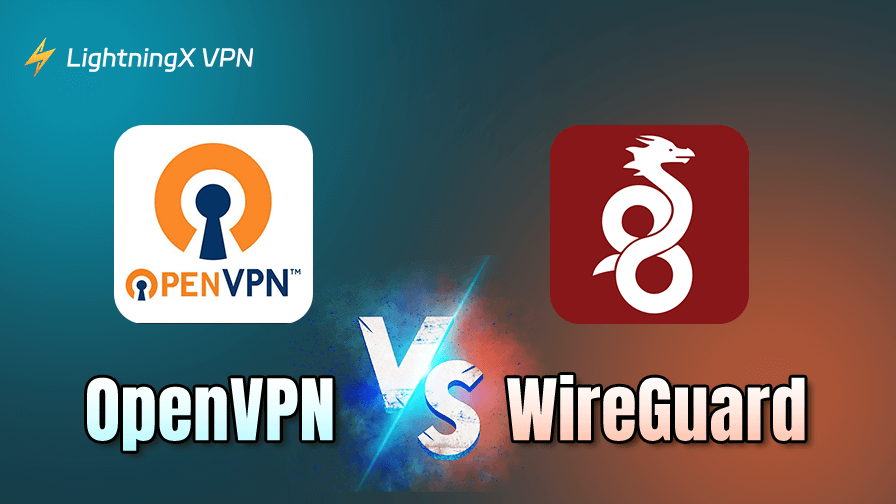WireGuard and OpenVPN are both common VPN protocols, but their performance and usage differ significantly.
WireGuard is lightweight, high-speed, and efficient. OpenVPN is known for its high configurability, stability, and powerful circumvention capabilities.
If you’re unsure which to choose, this guide will quickly help you understand their differences, from speed and security to compatibility and real-world user experience, helping you find the VPN protocol that best suits your needs.
What is WireGuard?

WireGuard is a fast, secure, and lightweight VPN protocol. It was built from the ground up to maximize performance and security while maintaining simplicity.
- It has only about 4,000 lines of code. Less code means fewer vulnerabilities and easier auditing and maintenance.
- WireGuard uses the ChaCha20 encryption algorithm. It’s faster on modern processors and more efficient than the AES-256 commonly used in traditional VPNs.
- Based on the Noise protocol framework, it requires only about 1.5 round-trip to establish a connection. This makes WireGuard one of the fastest VPN protocols available.
- It uses a fixed combination of encryption algorithms, reducing security risks from misconfigurations.
- It uses static public keys for authentication, similar to SSH. This simplifies network management and routing configuration.
- WireGuard is an open-source project, allowing global security experts to participate in review and improvement, enhancing overall security.
Read more: What Is WireGuard Protocol? How Does It Work?
What is OpenVPN?

OpenVPN is an open-source VPN protocol known for its strong encryption, flexibility, and reliability. It creates a secure, encrypted tunnel between your device and the VPN server. It disguises VPN traffic as regular HTTPS traffic to circumvent restrictions and prevent hackers, ISPs, and government surveillance. Split tunneling, network bridging, and proxy support are available. It works on Windows, macOS, Linux, iOS, Android, and even routers.
OpenVPN uses SSL/TLS encryption to secure the connection, using 256-bit encryption and modern cryptography to protect data. It operates in two modes:
- TCP (Transmission Control Protocol): Ensure a stable and reliable connection, best for general browsing and security-focused tasks.
- UDP (User Datagram Protocol): Prioritize speed, suitable for streaming, gaming, and other real-time activities.
Read more: TCP vs UDP: Which Is Better Protocol?
WireGuard vs. OpenVPN: What are the Differences?
| Feature | WireGuard | OpenVPN |
|---|---|---|
| Speed | Faster, optimized for performance | Slower, higher overhead |
| Encryption | Uses modern ChaCha20 encryption | Supports AES-256 and ChaCha20 |
| Connection Time | Instant connection | Slower due to complex key exchange |
| Codebase | 4000 lines (easier to audit) | 70000+ lines (more complex) |
| Security | Strong security, but lacks obfuscation | Well-tested, highly configurable |
| Privacy | Stores static IPs by default | Can be configured for minimal logging |
| Transport Layer | UDP only (faster but less flexible) | Supports both UDP & TCP |
| Compatibility | Limited router & legacy device support | Works on almost all platforms |
| Bypass Restrictions | No obfuscation, easier to detect | Supports obfuscation to bypass firewalls |
| Best for | Speed, efficiency, simple setup, mobile and Linux users | Maximum compatibility, advanced security, bypassing censorship |
WireGuard vs. OpenVPN: Speed Comparison
When it comes to speed, WireGuard is faster than OpenVPN. It’s faster and more lightweight, making it the best choice for performance-conscious users.
Why is WireGuard Faster?
- Optimized codebase: WireGuard is designed to be leaner, with only about 4,000 lines of code compared to OpenVPN’s 70,000+.
- Modern encryption: WireGuard uses ChaCha20 encryption, which is faster than OpenVPN’s AES-based encryption.
- Faster connection times: WireGuard can establish a VPN connection almost instantly, while OpenVPN takes longer due to its more complex key exchange process.
- Better throughput: WireGuard generally achieves higher speeds than OpenVPN, especially when network conditions are optimal.
For most users, the difference between WireGuard and OpenVPN won’t be too significant in everyday use. If your internet connection is slow or the VPN server is far away, speeds will drop regardless of which protocol you use.
If you value speed, WireGuard is the better choice. It’s faster, more efficient, and has faster connections.
WireGuard vs. OpenVPN: Which Is More Secure?
WireGuard and OpenVPN are very secure VPN protocols, but they differ in terms of privacy, encryption, and resistance to attacks.
WireGuard‘s Security
WireGuard’s small code base (about 4,000 lines) makes it easier to audit and reduces the possibility of hidden vulnerabilities. By default, it uses modern cryptography (ChaCha20 for encryption and Poly1305 for authentication) to ensure strong security.
However, WireGuard lacks obfuscation features and does not support dynamic IP. This means it is unsuitable for users needing additional privacy features to disguise VPN connections.
OpenVPN’s Security
OpenVPN has been around for over two decades and is one of the most well-tested VPN protocols. It supports a variety of encryption options, including AES-256 and ChaCha20.
However, more customization means more complexity and less security if OpenVPN is not configured correctly.
Both are excellent, but if privacy is your top priority, OpenVPN gives you more control over protecting your data. If you want a secure, fast VPN with minimal setup, WireGuard is better.
WireGuard vs. OpenVPN: Which has Better Compatibility?
OpenVPN boasts superior device compatibility. It runs on virtually all operating systems, including Windows, macOS, Linux, iOS, Android, and even routers. Most commercial VPN services support OpenVPN.
WireGuard was built for Linux and has been expanding its compatibility. While it now works on major platforms, it still lags behind OpenVPN in router support and integration with older systems.
Transport Layer: UDP vs. TCP
- OpenVPN supports both UDP and TCP, making it more versatile. TCP helps to bypass blocks on a restricted network.
- WireGuard only supports UDP, which means it is faster but less flexible.
Auditability and Security
Both protocols are open source. Anyone can check their code for security issues. However, WireGuard has a much smaller codebase, making it easier to audit and less prone to hidden vulnerabilities.
WireGuard vs. OpenVPN: Which Is Better?
You’ve learned the differences between WireGuard and OpenVPN. Which one should you choose? It depends on what you need from a VPN.
Why Choose WireGuard?
- High speed: WireGuard is built for performance. Thanks to its lightweight design and efficient ChaCha20 encryption, it’s about 3 times faster than OpenVPN.
- Simple: With only about 4,000 lines of code, it’s easier to audit, maintain, and troubleshoot than OpenVPN, which has over 70,000 lines of code.
- Fast connection time: WireGuard can establish a VPN connection almost instantly, making it ideal for mobile users who frequently switch networks.
- Better for Linux users: It runs directly in the Linux kernel, resulting in smoother, more efficient performance.
Why Choose OpenVPN?
- Good security and stability: After more than 20 years of real-world use, OpenVPN has been extensively tested and patched, making it a trustworthy choice.
- Advanced customization: Supports multiple encryption algorithms and authentication methods, allowing for customized security settings.
- Higher compatibility: It works on almost all platforms, including routers and older devices, and is the most widely supported VPN protocol.
- Bypass censorship and VPN blocking: Supports obfuscation, which means you can hide VPN traffic and access restricted content in countries with strict firewalls.
Read more: Best VPN Countries for Speed, Privacy and Streaming
Which One Should You Use?
- Top speed, simplicity, and modern encryption → WireGuard
- Strong compatibility, customization, and bypassing restrictions → OpenVPN
Which VPN Supports WireGuard or OpenVPN?
Many top VPNs support WireGuard and OpenVPN, allowing users to choose between speed and compatibility. Here’s a look at some of the best VPNs that use these protocols:
VPNs with WireGuard
- NordVPN: Faster speeds and more privacy using its own NordLynx protocol (built on WireGuard). Available on all major platforms.
- Surfshark: Affordable and fast. Uses a double NAT system to get around WireGuard’s privacy issues.
- LightningX VPN: A high-performance VPN with WireGuard integration. Unlimited bandwidth and speed. Fast, secure connections with minimal latency.
- ProtonVPN: A VPN from Switzerland that has WireGuard integrated into its app.
- IPVanish: WireGuard support, unlimited simultaneous connections, and solid security features.
LightningX VPN offers 800+ Mbps connections, 2000+ servers, and strong encryption protocols like WireGuard. It ensures that you can enjoy a high-speed and stable network with unlimited speed and bandwidth. Download it to enjoy a free trial!
VPNs with OpenVPN
- NordVPN: Offers OpenVPN (TCP/UDP) with customizable port options for security and flexibility.
- ExpressVPN: A top VPN known for strong encryption and high performance, it fully supports OpenVPN.
- CyberGhost: User-friendly and feature-rich, it makes it easy for beginners to use OpenVPN.
- PrivateVPN: Supports OpenVPN and has flexible settings, balancing security and speed.
Read more: 7 Best VPN Protocol [A User-Centered Guide]
FAQs: WireGuard vs. OpenVPN
1. Is WireGuard better than OpenVPN?
WireGuard is faster, lighter, easier to set up, and very efficient. OpenVPN is more mature, more configurable, and works on more devices, with better flexibility and compatibility.
If you want speed, choose WireGuard. OpenVPN is the better choice if you need more control and wider support.
2. Is WireGuard really secure?
Yes, WireGuard is very secure. It uses modern encryption and a simple, lightweight codebase, which makes it easier to audit and less likely to have hidden vulnerabilities.
However, it has no built-in obfuscation and may temporarily log IP addresses, so for maximum privacy, some VPN providers add additional layers of security to protect user privacy.
3. What is the most efficient VPN protocol?
WireGuard is considered the most efficient VPN protocol. It is faster, lighter, and easier to set up than older protocols like OpenVPN and IPsec. Its streamlined codebase maintains strong security.
However, OpenVPN is still better for advanced configurability and bypassing strict firewalls.















